 “Biologist works to separate wolf fact from fiction,” in the Laramie Boomerang. Doug Smith, a senior wildlife biologist in Yellowstone National Park and MTU alumni, presided over the reintroduction of wolves in Yellowstone nearly 25 years ago. The story was picked up by several media outlets including the Buffalo Bulletin, Bullalot, Wyoming.
“Biologist works to separate wolf fact from fiction,” in the Laramie Boomerang. Doug Smith, a senior wildlife biologist in Yellowstone National Park and MTU alumni, presided over the reintroduction of wolves in Yellowstone nearly 25 years ago. The story was picked up by several media outlets including the Buffalo Bulletin, Bullalot, Wyoming.
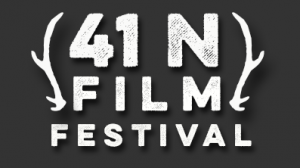 The annual 41 North Film Festival will be held Oct. 31 to Nov. 3 at the Rozsa Center for the Performing Arts. This year’s program features more than 20 films from around the world, along with music, events and special guests Anishinaabe filmmaker/producer Michelle Derosier and Michigan Tech alumnus actor/writer/producer Curtis Fortier.
The annual 41 North Film Festival will be held Oct. 31 to Nov. 3 at the Rozsa Center for the Performing Arts. This year’s program features more than 20 films from around the world, along with music, events and special guests Anishinaabe filmmaker/producer Michelle Derosier and Michigan Tech alumnus actor/writer/producer Curtis Fortier.
This year’s highlights include:
- Thursday, Oct. 31, 7:30 p.m.: HUMAN NATURE, which delves into the complexities of editing the human genome. Followed by a Q&A with Caryn Heldt (ChE), Paul Goetsch (BioSci) and Alexandra Morrison (HU).
- Friday, Nov. 1, 7:30 p.m.: PICTURE CHARACTER (an Emoji Documentary). This informative and entertaining film covers everything from how emojis came into existence to how new emojis are added to the unicode system. To add to the fun, come in an emoji-inspired costume and you might win a prize. Stick around after the film for emoji cookie decorating and music in the lobby.
- Saturday, Nov. 2, will feature a full day of programming about our relationship to the environment. Films include ANTHROPOCENE: THE HUMAN EPOCH, THE BIGGEST LITTLE FARM, HONEYLAND, and our featured presentation of Michelle Derosier and her film ANGELIQUE’S ISLE, inspired by the true story of Angelique Mott, an Anishinaabe woman who, with her husband, was abandoned by unscrupulous copper miners and left to die during the winter of 1845 on an island off of Isle Royale (today known as Mott Island).
- Sunday, Nov. 3. Michigan Tech alumnus Curtis Fortier will be on hand to present and discuss some of his work as an actor/writer/producer. Fortier will be followed by a new docudrama about the life of information theorist Claude Shannon, THE BIT PLAYER. The festival will close Sunday evening with MAIDEN, the thrilling and emotional story of the first all-female crew to compete in the Whitbread Round-the-World Yacht Race.
See the full line-up of films and events at 41northfilmfest.org. The festival is free and open to the public. Students will need to bring their HuskyCard. Tickets for everyone else can be reserved at tickets.mtu.edu or by calling 7-2073. They will also be available in the Rozsa lobby prior to each film.
We are happy to announce Yogesh Kumar Ahlawat (Biological Sciences), Rashmi Adhikari (BMB), and Roba Bdeir (BMB) are among the winners for the Doctoral Finishing Fellowship Award. Congratulations!
Finishing Fellowships provide support to PhD candidates who are close to completing their degrees. These fellowships are available through the generosity of alumni and friends of the University. They are intended to recognize outstanding PhD candidates who are in need of financial support to finish their degrees and are also contributing to the attainment of goals outlined in The Michigan Tech Plan.
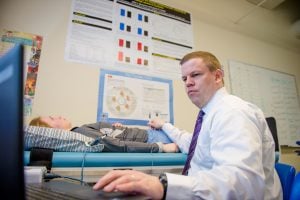 John Durocher (BIO) is a co-author on a paper published in this month’s Journal of Sport and Health Science. This project was in collaboration with two investigators from the University of Guelph. Results of the study indicate that individuals who participate in CrossFit exercise have comparable arterial stiffness to individuals who routinely participate in aerobic exercise.
John Durocher (BIO) is a co-author on a paper published in this month’s Journal of Sport and Health Science. This project was in collaboration with two investigators from the University of Guelph. Results of the study indicate that individuals who participate in CrossFit exercise have comparable arterial stiffness to individuals who routinely participate in aerobic exercise.
Ten graduate students, seven undergraduate students, four faculty members, and two recent alumni from Michigan Tech recently participated in the 6th annual Michigan Physiological Society Meeting held on the campus of Central Michigan University on June 27-28.
John Durocher (BIO) served as the president of the society and Ian Greenlund (KIP) served as the trainee committee chair. Four MTU graduate students completed oral presentations, with Jeremy Bigalke (KIP) winning one of the top oral presentation awards.
Another thirteen MTU students were active in poster presentations, with Sarah LewAllen (BIO) winning one of the top poster presentation awards. Finally, two graduate students served as moderators for oral presentations.
In conjunction with the annual meeting, the 3rd annual Michigan Physiology Quiz competition was held. Michigan Tech competed against six other teams from around the state. Team members included Jana Hendrickson (KIP), Sarah LewAllen (BIO), Jill Poliskey (BIO), and Colleen Toorongian (KIP).
The Michigan Tech team was very competitive through four rounds but missed making the final round between the top three teams by a single question. All team members did a great job with the intense questions.
Michigan Tech was one of only three universities from around the state to achieve Diamond-Level Sponsorship! This was possible thanks to the College of Sciences and Arts, Michigan Tech Graduate School, Department of Biomedical Engineering, Department of Kinesiology and Integrative Physiology, and Department of Biological Sciences. Additional faculty and staff members from Michigan Tech also made individual awards that contributed to the cash prizes for the quiz competition, oral presentations, and poster presentations.
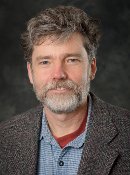 Casey Huckins (BS/GLRC) is Principal Investigator on a project that has received a $114,445 research and development contract with the Michigan Department of Natural Resources. The project is titled, ” Salmon Trout River Restoration and Coaster Brook Trout Confirmation.” This is a potential three- to four-year project.
Casey Huckins (BS/GLRC) is Principal Investigator on a project that has received a $114,445 research and development contract with the Michigan Department of Natural Resources. The project is titled, ” Salmon Trout River Restoration and Coaster Brook Trout Confirmation.” This is a potential three- to four-year project.
The 30th annual Bioathlon was held on May 8, 2019. A total of 52 students from 13 high schools across the U.P. and Wisconsin came together to compete in this year’s event.
Calumet High School claimed first place again, following their victory during last year’s competition! The team was comprised of Emma Aho, Hanna Tuoriniemi, Serenity Snyder, and Gracia Perala. Second place was awarded to Negaunee High School, and Houghton High School took third.
First, second and third place teams were awarded a plaque to display at school and each student on the team was awarded $200 for first place, $100 for second place and $50 for third place. All Bioathlon competitors received a certificate of participation and a t-shirt sporting this year’s competition logo.
Funding is provided by MTU Admissions, the Department of Biological Sciences, the Michigan Tech Fund, and MTU Alumni Mark Cowan, M.D., Robert C. and Kathryn DellAngelo, M.D., Olive Kimball, D.Ed., Ph.D., Nancy Auer, Ph.D., Janice Glime, Ph.D. and Jeffery and Sandra Lewin.
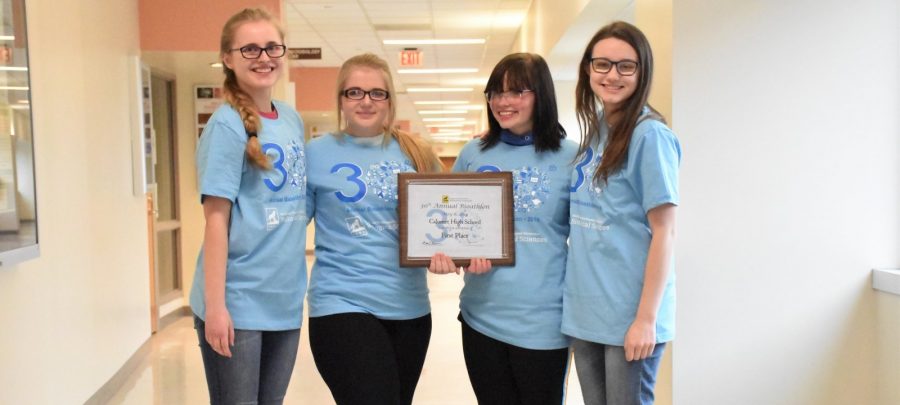
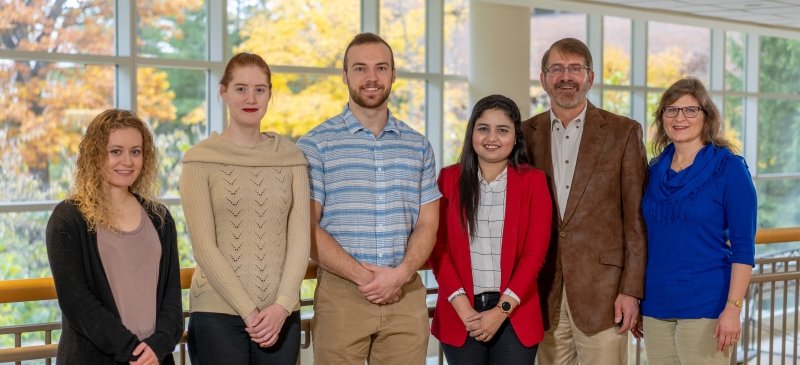
Matthew Songer, (Biological Sciences ’79) and Laura Songer (Biological Sciences ’80) have generously donated funds to the College of Sciences and Arts (CSA) to support a research project competition for undergraduate and graduate students. Remembering their own eagerness to engage in research during their undergraduate years, the Songers established these awards to stimulate and encourage opportunities for original research by current Michigan Tech students. The College is extremely grateful for the Songers’ continuing interest in, and support of, Michigan Tech’s programs in human health and medicine. This is the second year of the competition.
Students may propose an innovative medically-oriented research project in any area of human health. The best projects will demonstrate the potential to have broad impact on improving human life. This research will be pursued in consultation with faculty members within the College of Sciences and Arts. In the Spring of 2019, the Songer’s gift will support one award for undergraduate research ($4,000) and a second award for graduate research ($6,000). Matching funds from the College may allow two additional awards.
Any Michigan Tech student interested in exploring a medically related question under the guidance of faculty in the College of Sciences and Arts may apply. Students majoring in any degree program in the college, including both traditional (i.e., biological sciences, kinesiology, chemistry) and nontraditional (i.e., physics, psychology, social science, bioethics, computer science, mathematics) programs related to human health may propose research projects connected to human health. Students are encouraged to propose original, stand-alone projects with expected durations of 6 – 12 months. The committee also encourages applications from CSA students who seek to continue research projects initiated through other campus mechanisms, such as the Summer Undergraduate Research Fellowship (SURF) program, Pavlis Honors College activities or the Graduate Research Forum (GRF).
Funds from a Songer Award may be used to purchase or acquire research materials and equipment needed to perform the proposed research project. Access to and research time utilizing University core research facilities, including computing, may be supported. Requests to acquire a personal computer will be scrutinized and must be fully justified. Page charges for publications also may be covered with award funds, as will travel to appropriate academic meetings. This award may not be used for salary or compensation for the student or consulting faculty.
To apply:
- Students should prepare a research project statement (up to five pages in length) that describes the background, methods to be used, and research objectives. The statement also should provide a detailed description of the experiments planned and expected outcomes. Students must indicate where they will carry out their project and attach a separate list of references/citations to relevant scientific literature.
- The application package also should provide a concise title and brief summary (1 page) written for lay audiences.
- A separate budget page should indicate how funds will be used.
- A short letter from a consulting faculty member must verify that the student defined an original project and was the primary author of the proposal. The faculty member should also confirm her/his willingness to oversee the project. This faculty letter is not intended to serve as a recommendation on behalf of the student’s project.
Submit applications as a single PDF file to the Office of the College of Sciences and Arts by 4:00 p.m. Monday, April 22. Applications may be emailed to djhemmer@mtu.edu.
The selection committee will consist of Matthew Songer, Laura Songer, Shekhar Joshi (BioSci) and Megan Frost (KIP). The committee will review undergraduate and graduate proposals separately and will seek additional comments about the proposed research on an ad-hoc basis from reviewers familiar with the topic of the research proposal. Primary review criteria will be the originality and potential impact of the proposed study, as well as its feasibility and appropriateness for Michigan Tech’s facilities.
The committee expects to announce the recipients by early May of 2019. This one-time research award will be administered by the faculty advisor of the successful student investigator. Students will be expected to secure any necessary IRB approval before funds will be released. Funds must be expended by the end of spring semester 2020; extensions will not be granted. Recipients must submit a detailed report to the selection committee, including a description of results and an accounting of finds utilized, no later than June 30, 2020.
Any questions may be directed to Megan Frost (mcfrost@mtu.edu), David Hemmer (djhemmer@mtu.edu) or Shekhar Joshi (cpjoshi@mtu.edu).
 John Durocher was quoted for the story “Could A Single Mindfulness Session Ease Your Anxiety?” in Public Now.
John Durocher was quoted for the story “Could A Single Mindfulness Session Ease Your Anxiety?” in Public Now.
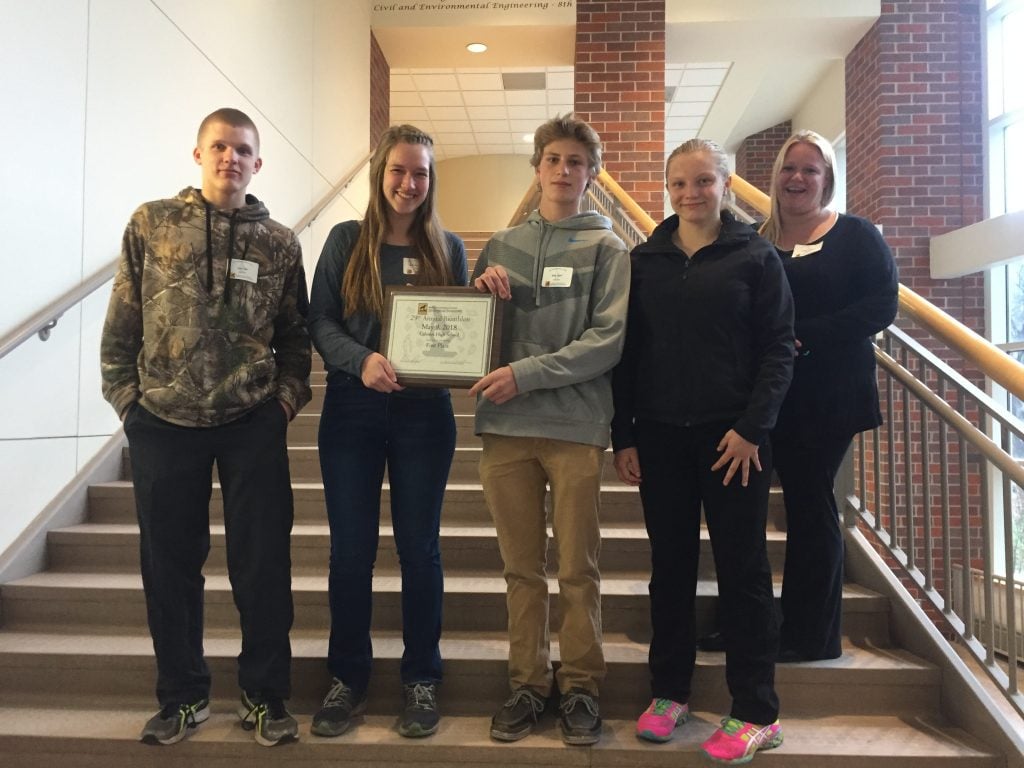 Third time’s a charm! After being in the top three scoring teams in the last year, Calumet High School was able to place first in the 29th annual Bioathlon. The team was comprised of Ada McDonal, Molly Helminen, Nick Djerf and Sam Oja. Second place went to A.D. Johnston High School from Bessemer, and West Iron County High School took third.
Third time’s a charm! After being in the top three scoring teams in the last year, Calumet High School was able to place first in the 29th annual Bioathlon. The team was comprised of Ada McDonal, Molly Helminen, Nick Djerf and Sam Oja. Second place went to A.D. Johnston High School from Bessemer, and West Iron County High School took third.
First, second and third place teams were awarded a plaque to display at school and each student on the team was awarded $200 for first place, $100 for second place and $50 for third place. All bioathlon competitors received a certificate of participation and a t-shirt sporting this year’s competition logo.
The competition was held on Wednesday, May 9th. The four problems the four-student teams tackled:
- Dissection: Designed by undergraduate students Jessica Benson, Becca Riffe, and Chance Sherretz-Hayes. This activity will be the dissection of a
- Microbiology: Designed by Biological Sciences graduate student Tim Buttler, assisted by undergraduate student Paige Webb.
- Field Identification: Designed by Biological Sciences graduate student Taylor Zallek assisted by graduate student Bailey Duxburry and undergraduate student Hannah Mckinnon Reish.
- Medical Laboratory Science: Designed by undergraduate Kaycee Kolar and assisted by Medical LaboratoryScience undergraduate students, Eleia Kozminski, Kayla Bates, and Jarett McClanahan.
Funding was provided by MTU Admissions, the Department of Biological Sciences, the Michigan Tech Fund, MTU Alumni Mark Cowan, MD, Robert C. and Kathryn DellAngelo, MD, Olive Kimball, D.Ed., PhD, Nancy Auer, PhD, and Janice Glime, PhD.